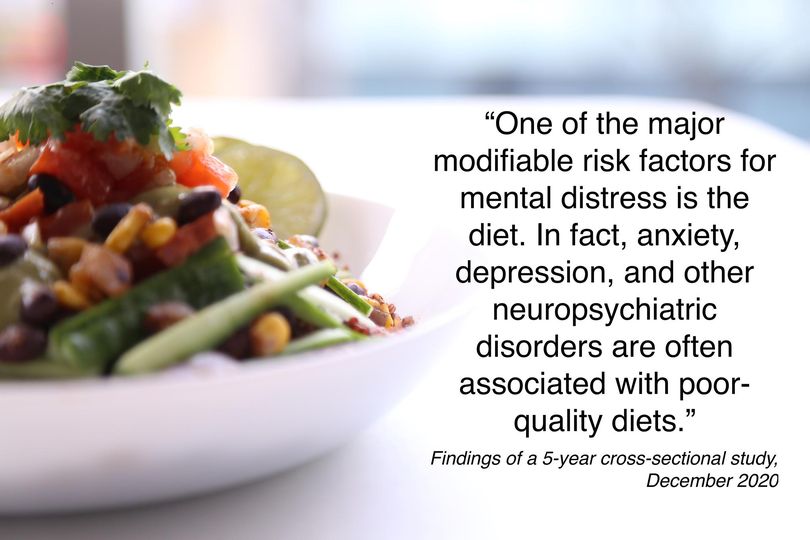
So many people are struggling right now. Many are trying to come to grips with the events of the past year and the impact on their lives. Stress, anxiety, and depression are at an all-time high. In addition (and to make matters worse), many people are having a difficult time accessing mental health services.
COVID-19 has had an adverse impact on mental health
According to a recent report released by the World Health Organization, the COVID-19 pandemic has disrupted mental health services in 93% of countries worldwide even as the demand for mental health care is significantly increasing. Now more than ever, people need access to information about steps they can take to support their mental wellbeing.
Diet is a major modifiable risk factor
Mental health is complex, and there are many contributing factors. One of the major modifiable risk factors for mental health issues is diet. A study published last month in the journal Nutrients reviewed the findings of a 5-year cross-sectional study, involving data from more than 2600 people from North America, Europe, Asia, the Middle East and North Africa.
The study notes that “anxiety, depression, and other neuropsychiatric disorders are often associated with poor-quality diets”. In addition, it found that adequate intake of certain nutrients is necessary for optimal brain function and mental health. Unlike many of the other factors adversely impacting our collective mental wellness right now (i.e., COVID stress, political flux, economic impacts, etc.), diet and nutrient intake is something within our control.
Eating an anti-inflammatory diet is key
Generally speaking, an anti-inflammatory Mediterranean-style diet provides the greatest mental health benefits. This type of diet includes lots of fruits and vegetables, healthy fats, nuts, and fatty fish. It’s also low in processed food. Choosing high quality and nutrient-dense whole foods while limiting processed foods decreases inflammation, hormonal imbalances, and insulin resistance. These are all potential factors in mental health.
Nutritional needs differ by age and gender
However, it’s interesting to note that the study documented distinct differences in nutritional needs for optimum mental health based on age and gender. The correlation between nutritional factors and mental health varied between men and women. It also differed between young (18–29 years) and mature (30 years or older) adults of the same gender. Overall, the study’s findings support the need to customize dietary and lifestyle recommendations to improve mental wellbeing.
As a nutritionist, my specialty is creating effective, customized nutritional strategies to support brain functioning, mood, and mental health, so this research is especially interesting (and encouraging!) to me. With each new study that comes out, the connection between nutrition and mental and emotional wellbeing is further solidified.
If you or someone you love is struggling with stress, anxiety, or depression, you can download a free report on evidence-based nutritional strategies that may help from my website.
2 thoughts on “Diet is a Major Risk Factor for Mental Health”